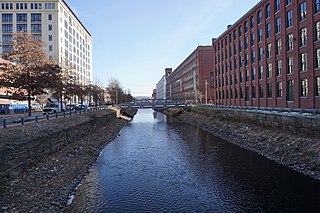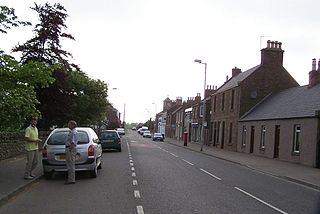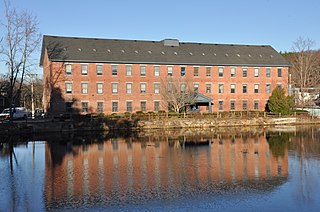Related Research Articles

Lawrence is a city located in Essex County, Massachusetts, United States, on the Merrimack River. At the 2020 census, the city had a population of 89,143. Surrounding communities include Methuen to the north, Andover to the southwest, and North Andover to the east. Lawrence and Salem were the county seats of Essex County, until the Commonwealth abolished county government in 1999. Lawrence is part of the Merrimack Valley.

North Andover is a town in Essex County, Massachusetts, United States. At the 2020 census the population was 30,915.

Andover is a town in Essex County, Massachusetts, United States. It was settled in 1642 and incorporated in 1646. At the 2020 census, the population was 36,569. It is located 20 miles (32 km) north of Boston and 4 miles (6.4 km) south of Lawrence. Part of the town comprises the census-designated place of Andover. It is twinned with its namesake: Andover, Hampshire, England.

Friockheim is a village in Angus, Scotland dating from 1814. It lies between the towns of Arbroath, Brechin, Forfar and Montrose.

Ballardvale is a village located within the boundaries of the town of Andover, Essex County, Massachusetts, United States. Growing originally in the 19th century around mills located on the Shawsheen River, the village is a local historic district, boasting many varieties of historic architecture and a rich industrial heritage.
Adam Haldane-Duncan, 2nd Earl of Camperdown, styled Viscount Duncan between 1831 and 1859, was a British nobleman and politician.
The American Woolen Company is a designer, manufacturer and distributor of men’s and women’s worsted and woolen fabrics. Based in Stafford Springs, Connecticut, the company operates from the 160-year-old Warren Mills, which it acquired from Loro Piana SpA in June 2014.

William Madison Wood was an American textile mill owner of Lawrence, Massachusetts who was considered to be an expert in efficiency. He made a good deal of his fortune through being hired by mill owners to turn around failing mills and was despised by organized labor.
Edmund "Eddie" Smith was a soccer player who played as a forward. He played professionally in both Scotland and the United States. Born in Scotland, he earned one cap for the United States national team.

Ballardvale station is an MBTA Commuter Rail station on the Haverhill Line, located in the Ballardvale village of Andover, Massachusetts.

The Andover Village Industrial District encompasses one of the 19th century industrial mill villages of Andover, Massachusetts known locally as "The Village". The growth of this village contributed to the decision in the 19th century to separate the more rural area of North Andover from the town. It is centered on a stretch of the Shawsheen River between North Main Street on the east and Moraine Street on the west. Most of the district's properties lie on Stevens Street, Red Spring Road, Shawsheen Road, and Essex Street, with a few properties also located on adjacent roads.

Arden is a historic estate at 276 N. Main Street in Andover, Massachusetts, United States. It was the home of two of Andover's most important mill owners, John Dove and William Madison Wood.

Shawsheen Village Historic District is a historic district in northern Andover, Massachusetts. Shawsheen Village was completed in the early 1920s as a planned corporate community. Conceived by William Madison Wood of the American Woolen Company, the village was designed a team of architects including Adden & Parker, Clifford Allbright and Ripley & LeBoutillier of Boston and James E. Allen of Lawrence. John Franklin, a civil engineer for the American Woolen Company was responsible for designing the village, under the direction of Wood. Buildings from the original Frye Village were also incorporated into the design which included a railroad station, shops, apartment buildings, factories, parks and numerous single-family dwellings. The village was located just up the road from the Company's main factories in nearby Lawrence.
George Alexander Philips Haldane Haldane-Duncan was the fourth and last Earl of Camperdown.

Doon is a suburban community and former village which is now a part of the city of Kitchener, Ontario, Canada. Doon was settled around 1800 by German Mennonites from Pennsylvania, and after 1830 by Scottish immigrants. The area is located at the confluence of Schneider Creek and the Grand River. The post office was opened in 1845. A large flour mill, oatmeal mill, distillery and sawmill were built on the Doon River over the following years. The Perine brothers established extensive linen works and flax mills near the settlement. By 1870, there was a single church, Presbyterian, a variety of tradesmen and a population of 200.
Dundee Park is a suburban business park located in the town of Andover, Massachusetts, situated across from the old Andover train station.

The South Church is a Protestant Christian place of worship located in Andover, Massachusetts, US. It was organized as the Second Church of Andover in 1711 with Rev. Samuel Phillips as its first pastor. It is currently part of the United Church of Christ.
The Acland Mill was the first jute mill established in India. The mill was established in 1855 by British entrepreneur George Acland and Bengali financier Babu Bysumber Sen in Rishra, Bengal Presidency, British India.

The Andover Public Schools district is the public school district for the town of Andover, Massachusetts. Overseeing 10 educational facilities, ranging from pre-kindergarten to the 12th grade, the district is administrated by superintendent Magda Parvey, who reports directly to an elected school committee, consisting of five residents of the town elected for three-year terms.
John Smith was a 19th-century industrialist in Andover, Massachusetts, whose Smith & Dove Co. mill employed up to 300 people spinning twine and thread from flax. Smith was also a philanthropist who inspired the building of the town's Memorial Hall Library and an abolitionist who co-founded the Free Christian Church on the principle of freedom for all people.
References
- ↑ Hughes, Madeline (2021-05-06). "'God blessed their cause': Free Christian Church celebrates 175 years". The Andover Townsman. Retrieved 2022-02-10.
- 1 2 3 4 5 6 7 "Smith & Dove Manufacturing Co. (company brochure)". Internet Archive (archived by Memorial Hall Library). 1926. Retrieved 2022-02-11.
- 1 2 3 4 5 "Smith & Dove Flax Mills". Andover Answers, Memorial Hall Library. Retrieved 2022-02-10.
- 1 2 3 4 "A Brief History of Andover: 1843-1927 Smith & Dove Manufacturing". Andover Center for History & Culture.
- ↑ Batchelder, Jim (2011-06-09). "Andover Stories: Abbot Village was a neighborhood defined by mills". The Andover Townsman. Retrieved 2022-02-10.
- 1 2 3 "Notable People Buried at West Parish Garden Cemetery". West Parish Garden Cemetery. Retrieved 2022-02-11.
- ↑ "Peter Dove Smith". Lest We Forget: Andover and the Civil War (Andover Center for History & Culture). Retrieved 2022-02-11.